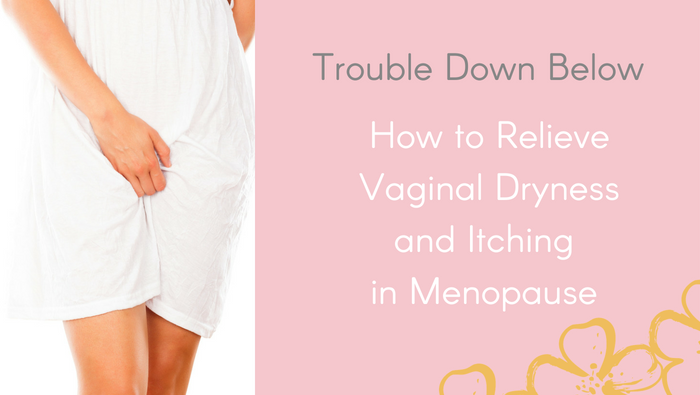Vaginal dryness and itching. And urinary infections.
No. laughing. matter.
Nothing to be embarrassed about either.
But it can tough to talk about it. Even though it’s very common in menopausal and post menopausal women.
Vaginal Dryness
As women transition through menopause, oestrogen drops. Lower oestrogen leads to thinning of vaginal tissue and can make the vagina drier and less elastic.
Of course, this can make sex uncomfortable and lead to bleeding due to friction. Sex can also cause bruising, inflammation and the burning sensation that we get when we have cystitis. No wonder some women would rather not have sex – when the pain and bleeding are too awful.
In turn, that can affect relationships.
Vaginal PH Balance
The acid/alkaline balance also changes as we mature.
Before menopause, the vagina is acid, keeping infection at bay. Afterwards, it’s more alkaline meaning we’re more prone to infections. Think bladder infections, vaginal infections, thrush, cystitis, itching. And they can be recurring.
Conventional Treatments
Where vaginal dryness and itching and and soreness makes intercourse – and even cervical smear tests – unbearable, its best to see a doctor.
It’s likely your doctor will prescribe oestrogen cream or pessaries to use in the vagina itself. It plumps up the tissue.
As with all conventional treatments, please do your homework before you make a final decision for yourself. Find out what the risks and side effects are as well as benefits. Ask how long you’ll need it for. Discuss whether you can take natural steps in time and perhaps stop using the cream or pessaries.
Some vaginal oestrogens are carcinogenic i.e. linked to higher risk of certain cancers.
Your doctor will also treat any infection found. Be aware that antibiotics also destroy good bacteria. So if you choose antibiotics, get a good probiotic alongside. See tip 1 below.
Possible Natural Approaches to Vaginal Dryness and Itching
#1 Some Supplements
I always think that supplements are best tailored to individuals. That’s why I recommend hair mineral tests for my clients. So we can see what mineral and toxic metal status is and get some insights from a Lab.
That said, a general supplement programme for menopausal women might be:-
- Good quality multivitamin and mineral for mature women, great for anti-ageing, heart health and bone health. Buy good brands as cheap ones are packed with fillers and ingredients our bodies can’t extract and absorb easily.
- High quality Omega 3 fish oils to reduce inflammation and protect heart, brain, bones and joints.
- Vitamin C 1000mg daily for immune boosting, skin and bone health. Buy it as Magnesium Ascorbate.
- A oral good probiotic to help balance the Ph in the vagina.
#2 Choose a Hormone Friendly Diet
Eating for nutrition will help support mucous lining health – including the vagina. There are some great tips included in this blog. Also drink plenty of filtered water or mineral water from glass bottle for hydration.
Phytoestrogens (plant oestrogens) in beans, peas, lentils, chickpeas and flax seed could help nurture oestrogen levels.
#3 Natural Lube
If you use vaginal oestrogen, you may not need this.
If you need a vaginal lubricant, choose a natural one. I suggest Yes or Preseed brands to my clients, as they are not filled with nasty chemicals. Who’d want to shove nasty, health and hormone-harming chemicals up their vajajay?
#4 Cranberries for Cystitis
But not just any old cranberry products, please.
Cranberry has been found to relieve cystitis because it stops bacteria attaching to the walls of the urinary tract. Who knew?
But buy either unsweetened juice or get dried cranberry supplement. Cranberry juice with added sugar or artificial sweetener is NOT a good idea.
#5 Use Natural and Unperfumed Products
Choose natural, organic and unperformed soaps, bath preparations and washing powder/liquid. Again, harsh chemicals could make issues worse.
#6 Review Your Meds
Some meds can be drying e.g. cold cures and allergy medicines. Ask your pharmacist or doctor if you think they could be adding to any issues.
Don’t suffer in silence. wonderful women. It’s thought around 50% of menopausal women will suffer some symptoms. Let’s raise awareness, help ourselves and talk to our doctors without embarrassment.
No. Laughing. Matter.
Love,



Recent Comments